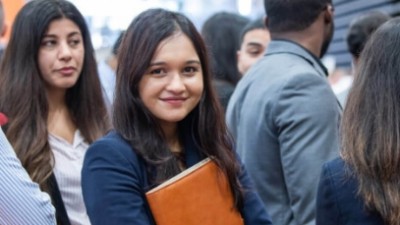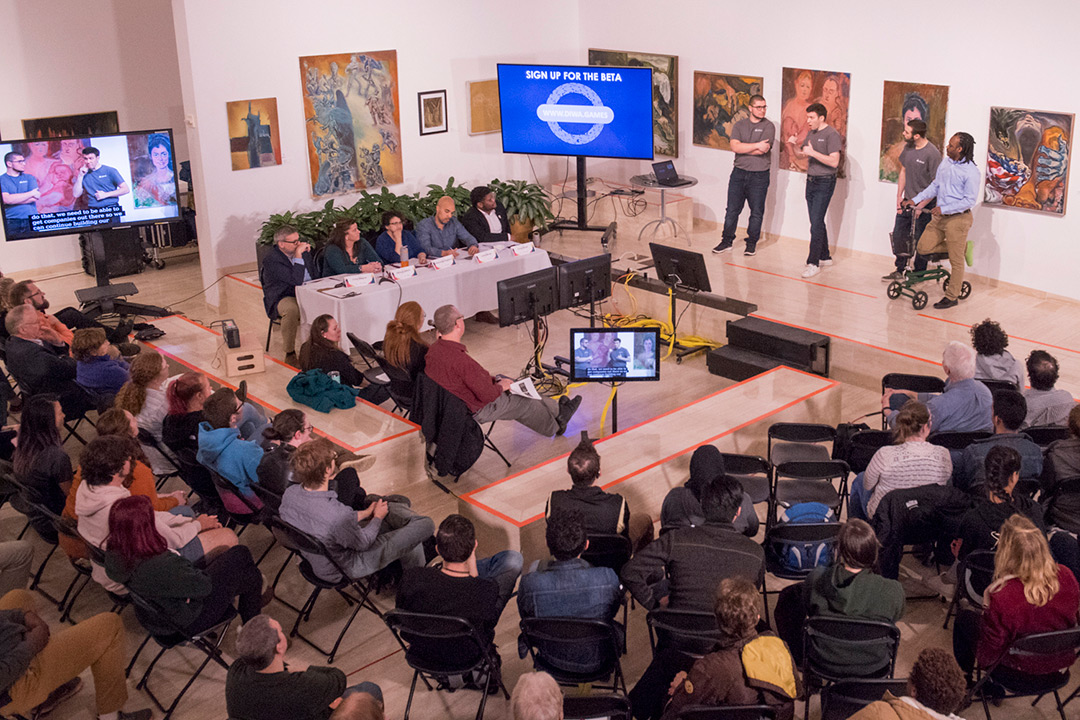Winners announced for RIT/NTID Next Big Idea entrepreneurship competition
Annual competition taps student teams to develop innovative products, services
Mark Benjamin
The student team representing DiwaTech presents their software interface idea to judges at NTID’s Next Big Idea competition on March 28.
Five teams of deaf and hard-of-hearing students from Rochester Institute of Technology’s National Technical Institute for the Deaf went head-to-head March 28 during The Next Big Idea business competition. DiwaTech, an interface design solution to improve video game accessibility, took home the $5,000 first prize.
Judges from the competition’s sponsor, ZVRS, a video-relay service headquartered in Clearwater, Fla., reviewed projects of the team finalists, asked questions and selected first-, second- and third-place winners.
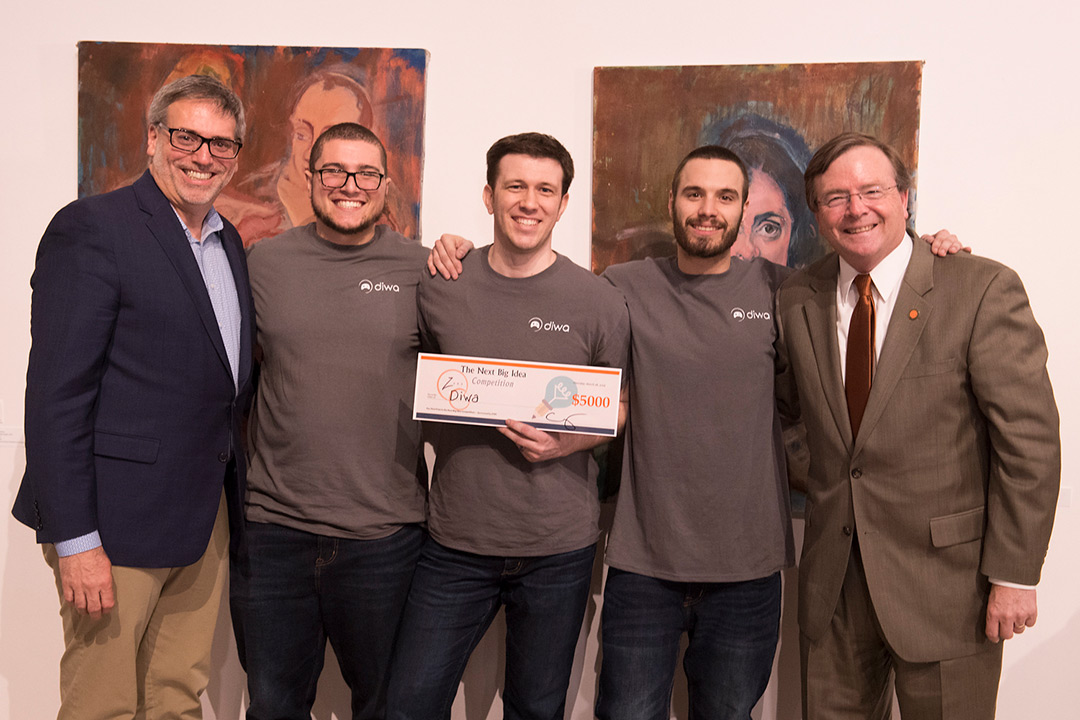 Mark Benjamin DiwaTech took first place in NTID’s Next Big Idea competition. Pictured here, from left to right, RIT alumnus and ZVRS CEO Chris Wagner; students Anthony DiGiovanni, Daniel Cox and Chad Cummings; and Gerry Buckley, NTID president and dean.
Mark Benjamin DiwaTech took first place in NTID’s Next Big Idea competition. Pictured here, from left to right, RIT alumnus and ZVRS CEO Chris Wagner; students Anthony DiGiovanni, Daniel Cox and Chad Cummings; and Gerry Buckley, NTID president and dean.First place: DiwaTech (Daniel Cox, a human-centered computing major from Rochester, N.Y.; Chad Cummings, a human-centered computing major from West Henrietta, N.Y.; and Anthony DiGiovanni, a web and mobile computing major from Rochester, N.Y.): By applying a user interface design solution, along with new technologies such as voice recognition, to operating systems, DiwaTech is creating a new software product that allows visualized sound data to represent audio output for video games. According to the team’s submission, “Our vision is to bring accessibility awareness to the video game industry and to develop accessibility standards for video games. We believe this will benefit deaf gamers worldwide.”
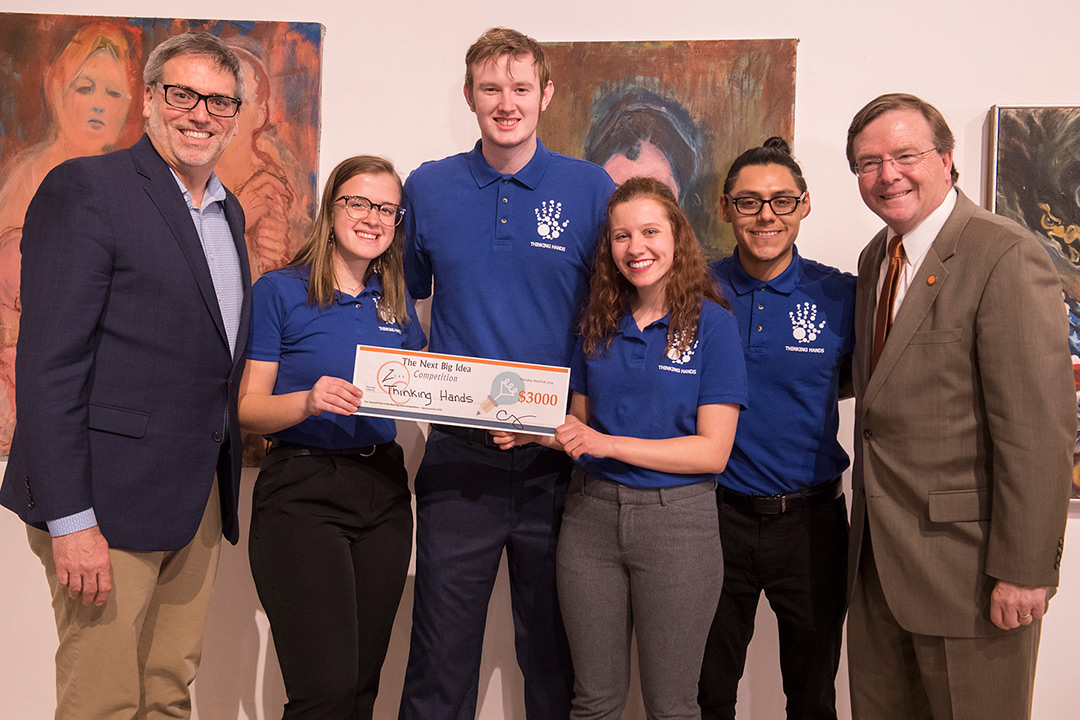 Mark Benjamin The team from Thinking Hands, an online educational platform for deaf and hard-of-hearing student, took second place. Pictured here, from left to right, RIT alumnus and ZVRS CEO Chris Wagner; students Alina Kenina, Gabriel Viet, Karina Baker and Moises Tobias; and Gerry Buckley, NTID president and dean.
Mark Benjamin The team from Thinking Hands, an online educational platform for deaf and hard-of-hearing student, took second place. Pictured here, from left to right, RIT alumnus and ZVRS CEO Chris Wagner; students Alina Kenina, Gabriel Viet, Karina Baker and Moises Tobias; and Gerry Buckley, NTID president and dean.Second place: Thinking Hands (Karina Baker, a sociology and anthropology major from Culver City, Calif; Moises Tobias, a design and imaging technology major from West Henrietta, N.Y.; Alina Kenina, an exercise science major from Clarksburg, Md.; and Gabriel Veit, a new media/industrial design major from Austin, Texas): Thinking Hands is an online educational platform that aims to provide academic support for deaf and hard-of-hearing students through the development of interactive educational videos taught in American Sign Language. Thinking Hands took home the $3,000 second prize.
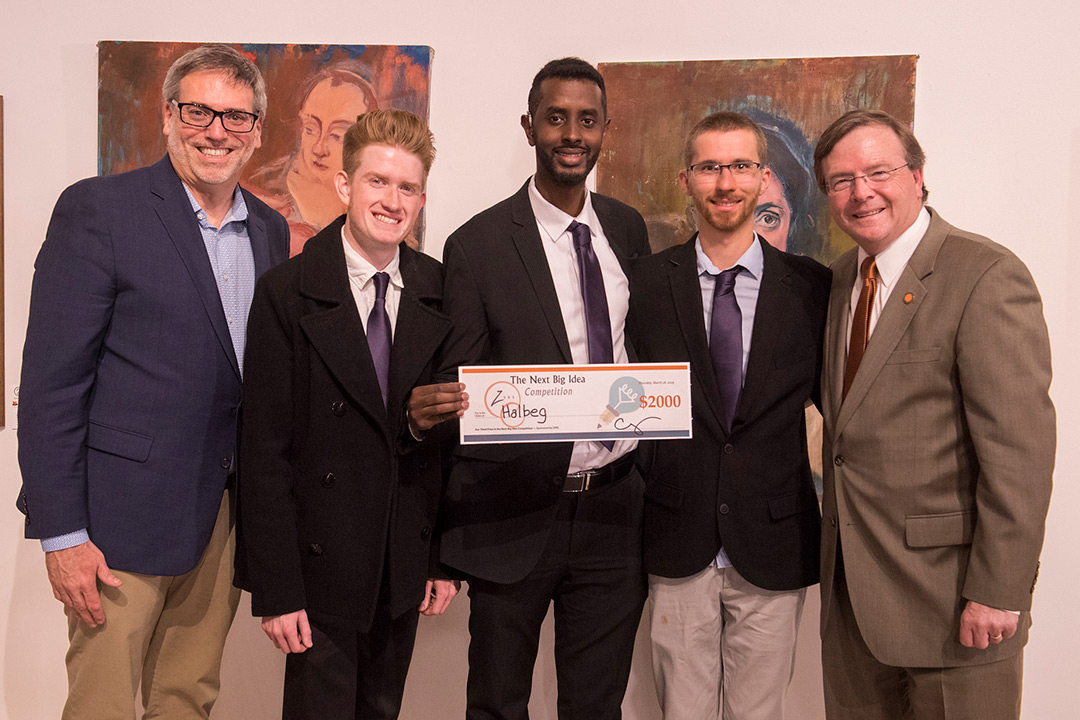 Mark Benjamin The team from Halbeg, a private networking platform for businesses, took the third place prize. Pictured here, from left to right, RIT alumnus and ZVRS CEO Chris Wagner; students Tyler Anderson, Bakar Ali and Eric Epstein; and Gerry Buckley, NTID president and dean.
Mark Benjamin The team from Halbeg, a private networking platform for businesses, took the third place prize. Pictured here, from left to right, RIT alumnus and ZVRS CEO Chris Wagner; students Tyler Anderson, Bakar Ali and Eric Epstein; and Gerry Buckley, NTID president and dean. Third place: Halbeg (Bakar Ali, an MBA student from Somalia; Tyler Anderson, a journalism major from Las Vegas; and Eric Epstein, a software engineering major from Tucson, Ariz.): Halbeg Technologies makes all-in-one private networking platforms for businesses that want to improve interaction within communities. It offers a simple way for members within communities to share resources such as posting requests, offering jobs, trading or bartering goods, carpooling or ridesharing, and chatting about community issues, in one platform. Team members said, “Our ‘all-in-one’ platforms make it easier for locals to interact and participate in a shared economy, improving the overall sustainability of the local business community.” Halbeg won the $2,000 third-place prize.
Other finalists were Fireblazer News (Eric Belozovsky, a human-computing interaction major from Framingham, Mass; Eleazar Contreras, a web and mobile computing major from Chicago; Anderson Pleasants, a political science major from Williamsville, N.Y.; and Daniel Devor, an ASL-English interpretation major from Gibsonia, Pa.), which works with hearing news outlets to translate audio, written and TV news content into sign language; and Foldify (Musab Al-Smadi, a software engineering major from Rochester, N.Y.; Steven McClusky, a software engineering major from Blue Springs, Mo.; and Matthew Watkins, an electrical mechanical engineering technology major from Covina, Calif.), which makes folding clothes simpler with an electric machine that reduces human time and effort.
The Next Big Idea competition is an annual event where teams of students combine skills related to their individual majors to create innovative products, technology or businesses. Teams work with mentors on their projects and compete before judges for cash prizes. This year marks the eighth anniversary of the competition.




